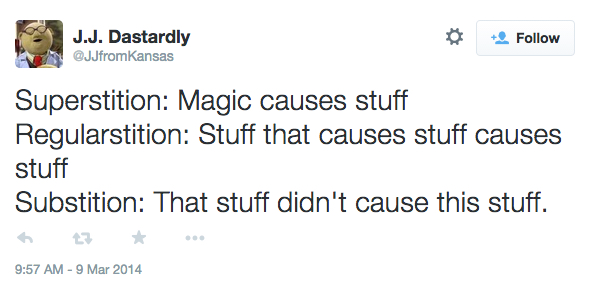n. A fact that many people do not believe, no matter how often it is shown to be true.
2015
It is pretty obvious that conservatives prefer a lie with which they feel comfortable, to the truth, which they find offensive. This is a further example of both superstition (belief in things which are not true), and substition (failure to believe in facts.)
2013
Climate change is real, even though any number of people, at their great peril, refuse to believe in it. Climate change is a substition. For most of human history, bacteria and viruses weren’t believed to be real even though people died of them. Bacteria were a substition. Just because you don’t believe in infectious diseases doesn’t make them any less real.
2012
Superstition: it's not real, even if you believe in it. Substition: it's real, even if you don't believe in it. #pratchett
1997 (earliest)
71-hour Ahmed was not superstitious. He was substitious, which put him in a minority among humans. He didn't believe in the things everyone believed in but which nevertheless weren't true. He believed instead in the things that were true in which no one else believed. There are many such substitions, ranging from "It'll get better if you don't pick at it" all the way up to "Sometimes things just happen."
Substition was coined by the novelist Terry Pratchett, who died yesterday from Alzheimer's disease. It's the opposite of superstition. That is, a superstition is something that isn't real, but many people believe, so a substition is something that is real, but many people do not believe. For completion's sake, there's also "regularstition":

